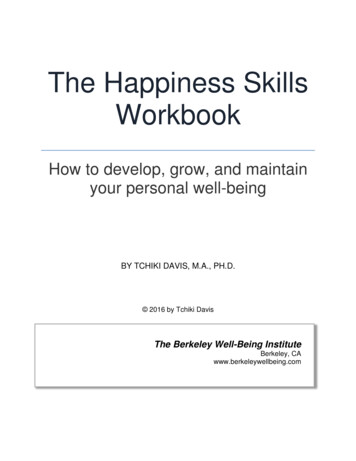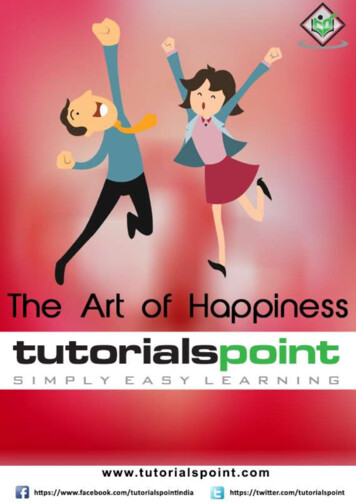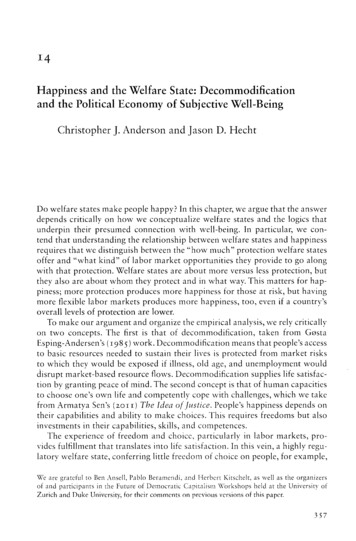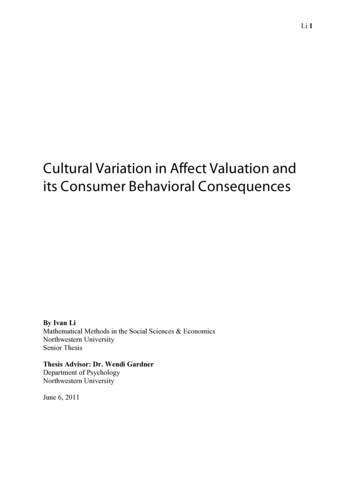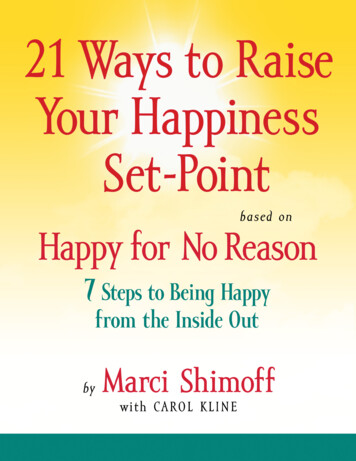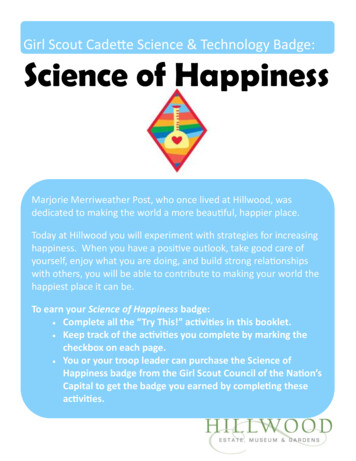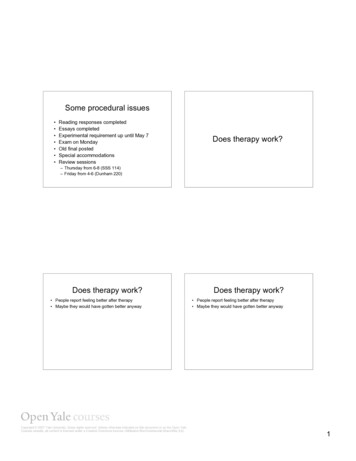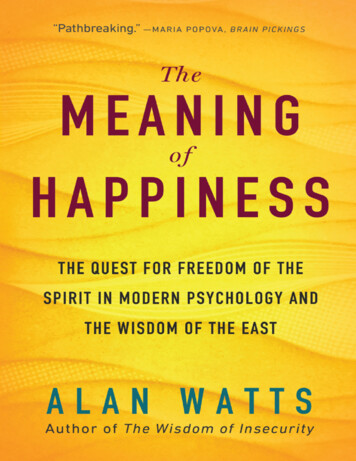
Transcription
New World Library14 Pamaron WayNovato, California 94949Copyright 1940, 1968 by Alan W. WattsCopyright 2018 by Joan Watts and Anne WattsAll rights reserved. This book may not be reproduced in whole or in part, stored in a retrieval system,or transmitted in any form or by any means—electronic, mechanical, or other—without writtenpermission from the publisher, except by a reviewer, who may quote brief passages in a review.Text design by Tona Pearce MyersLibrary of Congress Cataloging-in-Publication DataNames: Watts, Alan, 1915–1973, author.Title: The meaning of happiness : the quest for freedom of the spirit in modern psychology and thewisdom of the East / Alan Watts.Description: Novato : New World Library, 2018. Originally published: New York : Harper &Brothers, c1940. Includes bibliographical references and index.Identifiers: LCCN 2018019350 ISBN 9781608685400 (alk. paper) ISBN 9781608685417 (ebook)Subjects: LCSH: Happiness. Mysticism.Classification: LCC BJ1481 .W37 2018 DDC 158—dc23LC record available at https://lccn.loc.gov/2018019350First New World Library printing, August 2018ISBN 978-1-60868-540-0Ebook ISBN 978-1-60868-541-7Printed in Canada on 100% postconsumer-waste recycled paperNew World Library is proud to be a Gold Certified Environmentally ResponsiblePublisher. Publisher certification awarded by Green Press Initiative.www.greenpressinitiative.org10987 65 4 32 1
CONTENTSForeword to the Third EditionPreface to the Second (1952) EditionPreface to Laymen and SpecialistsIntroduction1. War in the Soul2. The Answer of Religion3. The Way of Acceptance4. The Return of the Gods5. The Vicious Circle6. The One in the Many7. The Great Liberation8. The Love of LifeNotesBibliographyIndexAbout the Author
FOREWORD TO THE THIRD EDITIONIwas two years old in 1940 when The Meaning of Happiness wasoriginally published. I don’t remember ever reading the book or havinga copy of it until just recently. My father, Alan Watts, was all of twenty-fouryears old when he wrote it, and my mother, Eleanor (his first wife), towhom he dedicated it, was barely twenty. The copy I have now is thesecond edition, published by James Ladd Delkin in 1953, and, ironically,inscribed to Alan’s third wife, Mary Jane, in 1959. I often wondered aboutthe title of the book and whether he developed his theory on happiness tounderstand the depression and resulting unhappiness Eleanor dealt withthroughout her life. He mentioned in his autobiography, In My Own Way,that Eleanor was involved in reading the manuscript and encouraged him tobe honest and to really think through what he meant.Alan, at the time, told his parents he was developing “a philosophy ofacceptance” for a new book. The title then became The Anatomy ofAcceptance, which the publisher, Harper, changed to The Meaning ofHappiness. Reading it, I’ve tried to wrap my head around the fact that thisman understood what he did about the human condition at the young age oftwenty-four. He looks at happiness from every possible angle. His initialpremise for the book was to address the question, “What do Eastern andWestern psychology, taken together, have to say about the elusive andpressing subject of human happiness?” The concept of duality, a commontheme in his writings, emerges here with the thesis that in order toexperience happiness, one must suffer sadness and that such oppositeseventually become complementary.Alan wrote in a letter to his parents in June 1940, just two months afterthe book came out, “When I finished that book, I thought it reasonably free
from inadequacies, but now, each week shows me another hole in it. Thereare things left unsaid and I say to myself, ‘There are more things in heavenand earth than are dreamed of in your philosophy.’”At the time he wrote this book, Alan admits he was somewhat under theinfluence of Carl Jung, but then notes a sense of inadequacy—that he, Alan,had in fact described a psychological process without any metaphysicalfoundation. In retrospect, Alan felt that Jung’s refusal to relate hispsychology to any one system of metaphysics became his own book’sprofound weakness.Despite all that, my feeling is that The Meaning of Happiness is astimely in its philosophical premise as it was nearly eighty years ago. I leavesubsequent interpretation to the reader.Joan WattsLivingston, MontanaJune 2018
PREFACE TO THE SECOND (1952) EDITIONThis book first appeared in the spring of 1940, at the very momentwhen the Second World War broke loose in all its violence. Despitethe fact that it was published at that most inauspicious time and the fact thatits title gave it the outward appearance of a type of “inspirational literature”far removed from its inner content, The Meaning of Happiness has been“sold out” for many years—during which I have received repeated requestsfor its republication.I have hesitated to comply with this demand because in so many waysmy ideas have gone far beyond the philosophy of a book written when Iwas only twenty-four years old. Yet this book and an even earlier book, TheSpirit of Zen, remain the favorites of many readers. Setting aside, however,certain immaturities of style and organization, as well as of certain lines ofdevelopment, the essential theme of this book is, for me, as valid and asimportant as ever. It has continued as the basic insight of all that I havewritten subsequently—books in which I have tried to express it in terms ofa variety of differing philosophical and religious “languages.”This theme is concerned with the realization of “happiness” in theAristotelian and Thomistic sense of man’s true end or destiny, in whichsense happiness means union with God, or, in Oriental terms, harmony withthe Tao, or moksha, or nirvana. The point on which I have insisted in manydifferent ways is, in brief, that this special and supreme order of happinessis not a result to be attained through action, but a fact to be realized throughknowledge. The sphere of action is to express it, not to gain it.The exposition of this theme involves a number of peculiar logical andpsychological difficulties. From a rigorously logical point of view, thewords in which this theme is stated mean exactly nothing. In the terms of
the great Oriental philosophies, man’s unhappiness is rooted in the feelingof anxiety which attends his sense of being an isolated individual or ego,separate from “life” or “reality” as a whole. On the other hand, happiness—a sense of harmony, completion, and wholeness—comes with therealization that the feeling of isolation is an illusion. In fact, that which feelsitself to be the separate, individual consciousness is identical with thatuniversal and undivided Reality of which all things are manifestations.The Meaning of Happiness explains that the psychological equivalent ofthis doctrine is a state of mind called “total acceptance,” a yes-saying toeverything that we experience, the unreserved acceptance of what we are, ofwhat we feel and know at this and every moment. To say, as in the Vedanta,that “All is Brahman,” is to say that this whole universe is to be accepted.To put it in another way, at each moment we are what we experience, andthere is no real possibility of being other than what we are. Wisdomtherefore consists in accepting what we are, rather than in strugglingfruitlessly to be something else, as if it were possible to run away fromone’s own feet.But if you cannot run away from your feet, you cannot run after themeither. If it is impossible to escape from reality, from what is now, it isequally impossible to accept or embrace it. You cannot kiss your own lips.Speaking logically, the idea of accepting one’s experience in its totalitymeans nothing. For “yes” has meaning only in relation to “no,” so that if Isay “yes” to everything the word ceases to have any content. To abolish allvalleys is to get rid of all mountains. By the same logic, it is equallymeaningless to say “All is Brahman,” for statements which are applied toall experiences whatsoever add nothing to our knowledge. When I have saidthat this whole universe is life, reality, Tao, or Brahman, I have said nomore than that everything is everything!It is easy, then, to sympathize with the reviewer of this book who said,“The mountain has labored and brought forth a mouse.” Yet he wasmistaken in one slight respect. There was no mouse. And in this tremendoustrifle lies the real significance of the book—the meaning which was hiddenbetween the lines because it could not be stated in the words. For betweenthe lines is the paper, the seeming emptiness or nothing, on which the wordsare printed and which is quite essential to their being printed at all. In arather similar way, Reality or Brahman is the essential basis of every thing
and experience. If I say that paper underlies every word on this page, Imight perhaps be understood as saying something like this:which is neither sensible nor true.Just as the words cannot “utter” the paper beneath them, because thepaper is not another word, so logic cannot express Reality. In logic, wordsmean nothing if they do not describe particular experiences. But just as thepaper is not a word, Reality or Brahman is not a particular experience. Thestatement “All is Brahman” is indeed nonsense if “Brahman” is held, likemost other words, to denote a special experience. Yet if Brahman is nothingthat we can experience, why trouble to talk about it at all? Am I not sayinga great many words about something of which I know nothing?Here is the whole point of the nonexistent mouse over which themountain labored. I do not know Brahman just as I do not see sight. If I amReality, I cannot grasp it. The life, the Tao, which is the experience of thisand all moments I can neither escape nor accept. Every attempt to escapefrom life or to accept life is as much a vicious circle, as plain an absurdityas trying to know knowledge, to feel feeling, or to burn fire.It is only when you seek it that you lose it.You cannot take hold of it, nor can you get rid of it;While you can do neither, it goes on its own way.You remain silent and it speaks; you speak and it is silent.So what?So that is what millions of human beings make themselves perfectlymiserable trying to do. The laboring of the mountain is the fantastic effortof man to grasp the mystery of life, to find God, to attain happiness, to layhold on absolute, eternal Being. He clutches at his own hand. He seeks whathe has never lost. He suffocates from holding his breath.This absurdity is only possible on the basis of the feeling that “I” amone thing and “life” or “reality” another, that the knower is separate fromhis knowledge, the known. This book suggests a total acceptance ofexperience by way of what is called in Buddhism upaya—a device for
bringing about an awakening. The hope is that in trying to accept life totallyone will discover, not in theory alone but in fact, that “whosoever wouldsave his life shall lose it,” because one is attempting the impossible task ofself-love. The psyche of the average man is in a perfect knot of tensionthrough trying to lay a firm, permanent hold on the life which is its ownessence. The attempt to “accept” life tightens this knot to the point wherethe very impossibility of the task reveals its absurdity.When this is realized in fact, and, I repeat, not in theory alone, therecomes into being that state of liberation or release from self-tension whichis the meaning of moksha and nirvana, and Tao—the creative power of life—flows forth freely, no longer blocked by the attempt to turn it back onitself.Written so long after the book itself, this is perhaps more of an epiloguethan a preface, and the reader may do well to refer to it again after whatfollows it in the space of pages but precedes it in the course of time.Alan W. WattsThe American Academy of Asian StudiesSan Francisco, 1952
PREFACE TO LAYMEN AND SPECIALISTSBooks on happiness are generally speaking of two kinds. There arethose which tell us how to become happy by changing ourcircumstances, and those which tell us how to become happy by changingourselves. And then, if such books are not mere philosophy, both kindsproceed to give practical advice as to the ways and means in whichhappiness may be attained, describing a spiritual, psychological, or materialtechnique to achieve the desired result.This book falls into neither of these two categories, its author believingthat happiness of the profoundest kind is beyond the reach of any techniqueunder the sun. Although he claims that this book is strictly practical, it doesnot name a single thing which one can do in order to become happy.Naturally it will be asked, “If there is nothing that one can do either tooneself or to one’s circumstances in order to become happy, is any purposeto be served in writing a book to state such a dismal conclusion?” But theconclusion is not dismal. To put it bluntly, it is possible in a certain sense tobecome happy without doing anything about it. We do not go quite so far asto say that, without knowing it, man is already more happy than he has everdreamed. Obviously, this is not true, although it is very nearly true. For theobject of this book is to prove to men and women something aboutthemselves as they are now, which, if understood, at once creates thegreatest happiness that man can know. By this is not meant a state of mereemotional and mental comfort or gaiety, but rather an inward experience ofthe spirit which persists through the deepest suffering.As this book is written primarily for laymen, the author hopes he will beforgiven for calling rather frequently on two departments of knowledgewhich are usually the special preserve of the learned, namely the
philosophy of ancient Asia and certain aspects of modern psychology. Hehas therefore had to employ a number of special terms because the Englishlanguage is not always equipped to express certain ideas in plain,straightforward words without lamentable confusion and misunderstanding.He trusts, therefore, that such terms are sufficiently explained, but asks it tobe borne in mind that every human being speaks a different language andthat sometimes it seems as if words were made to conceal thoughts. Now itis often that the specialist, the professional philosopher or psychologist,delights in the precise use of words, and sometimes he will find this bookextremely irritating because it uses words whose meaning is quite clear tothe “man in the street” but utterly obscure to the philosopher. For examplewe may take such words as “life,” “nature,” “love,” “fate,” or “soul.” Thesewords have been used freely because they are living words, which, if readwithout hypercritical sophistry, can mean more than any number of specialterms. Thus it will be seen that the author has tried to steer a middle coursebetween the two obscurities of oversimplicity and overtechnicality.Some Orientalists and psychologists may complain that their researcheshave been grossly misused and misinterpreted in some of the conclusionswhich have been drawn from them. Various aspects of Christian theologymay seem to have suffered in the same way, but, for those who wish toinquire more closely into original sources, notes giving “chapter and verse”have been provided at the end of the book. One thing more must be said forboth laymen and specialists, and particularly for reviewers. Each chapter inthis book is an introduction to the last, upon the subject of which the wholevalidity of the central theme depends and apart from which it should not bejudged.In conclusion the author wishes to thank Dr. Charles G. Taylor of NewYork for his advice on preparing an important section of the manuscript,and also the Rev. Sokei-an Sasaki for allowing the author to consult histranslation of an otherwise unavailable text.Alan W. WattsNew York CityJanuary 1940
Sometimes naked, sometimes mad,Now as a scholar, now as a fool,Thus they appear on earth—The free men!—Hindu poem
INTRODUCTIONDuring the last fifty years the mental life of Western civilization hasbeen invaded by two forces which are having a profound thoughgradual influence on our attitude to life. One of these forces has emergedfrom the West itself, while the other has come from far distant lands. Atfirst sight no one saw that these two influences had anything in common,but with the growth of experience it is becoming clear not only that theyare, in spirit, closely bound together, but also that their effects reach farbeyond the places where they are professionally studied.The first, a product of the West, is the form of scientific psychologyassociated with the names of Freud and Jung, which bases its research andpractice on the idea of the unconscious mind and whose object is the purelypractical one of healing the mentally sick. The second force is a product ofthe Orient, and is the wisdom of ancient India and China which has beenrevealed to us in its fullness only in comparatively recent years by thelabors of scholars in Sanskrit, Pali, Chinese, and Japanese. At first it wasthought that the wisdom they revealed was of little more than academicinterest, and had the misérable vanité des savants had its way the treasuresof Hindu, Buddhist, and Taoist thought would have remained as much apreserve for the merely erudite as Roman law and Egyptian hieroglyphics.It was soon recognized, however, that this treasure of spiritual literature wasnot only beautiful to read and consider; it was also seen to be of practicaluse. The ideas and precepts contained in it were not only as true for ourown time and place as for the ancient East; they were also, if not entirelynew to us, suggestive of new approaches and new ways of adjustment toproblems very close to our hearts, and seemed to offer ways of amplifyingthe wisdom of the West.
An inquiry into the relations between Oriental religion and thepsychology of the unconscious might be of interest to those who specializein these things, but the object of this book is much wider. For neither wasoriginally evolved for the express benefit of specialists; their purpose wasand is to assist mankind as a whole, and because there are many closelikenesses in their method of inquiry they have come to similar conclusions—or perhaps it would be better to say “working hypotheses.” This form ofpsychology has taught that man’s conscious self and its various faculties ofreason and emotion are the outward appearance of a hidden, mentaluniverse in which the true origin of his thoughts and deeds is to be found. Inother words, it would say that man’s true self goes a long way beyond hisconscious “ego” or “I” which is the unknowing instrument of theunconscious, or of “nature-in-man.” When the ego is unaware of thiscondition it arrogates to itself powers and capabilities which set it inconflict with the unconscious, and from this conflict arise the greater part ofour psychological troubles. But when we become conscious of thelimitations of the ego and understand its relation to the unconscious, thenthere is some chance of true mental health. This is strikingly similar tomany Oriental teachings if we can substitute for the term “unconscious” or“nature-in-man” such Oriental terms as “Tao,” “Brahman,” and the like,which mean the (to us) unknown self of both man and life, or nature.It will therefore be necessary to explore these similarities to someextent, but it is even more important to consider what the invasion of ourcivilization by these two forces can mean for ordinary men and womenwhose interest in such subjects is purely practical. For the number of peoplewho have such an interest in either or both of these things is much greaterthan is generally realized. Moreover many religious cults of the present dayare considerably influenced by Oriental ideas, especially the many forms oftheosophy, occultism, and mysticism patronized by so many people whomthe ordinary churches fail to satisfy. Therefore we have to ask just whatcontribution these two forces have to make to the happiness of the averagehuman being who wishes to benefit from them without becoming apsychological or Oriental specialist.Many people have tried to answer this question from the standpoint ofpsychology alone or Oriental philosophy alone. But few attempts have beenmade to explore the possibilities from the standpoint of both. Why should
this be done? Because there are certain elements in Oriental philosophywhich are utterly unsuited to Western life and these elements are not easilyseen unless brought to the attention by a critical method which only thispsychology of the unconscious can provide. Furthermore, psychology hasmuch to gain from the ancient East. In the West psychology is a newscience; in the East it is very ancient, and in fact it is not correct to speak ofOriental philosophy at all, for in no sense is it philosophy as we understandit. Essentially it is neither speculative nor academic; it is experimental andpractical, and is much closer to psychology than philosophy.But the need for a rapprochement between the two has for some timebeen recognized by the foremost living practitioner of this particular type ofpsychology—C. G. Jung of Zurich.1My experience in my practice [he writes] has been such as to reveal to me a quite new andunexpected approach to eastern wisdom. But it must be well understood that I did not haveas a starting point a more or less adequate knowledge of Chinese philosophy. On thecontrary, when I began my life-work in the practice of psychiatry and psychotherapy, I wascompletely ignorant of Chinese philosophy, and it is only later that my professionalexperiences have shown me that in my technique I had been unconsciously led along thatsecret way which for centuries has been the preoccupation of the best minds of the East.Because of this admission many of his contemporaries have chargedJung with mysticism and departure from strict scientific method. Suchcharges, however, are based on a very understandable ignorance of the truecharacter of Oriental psychology and of those aspects of it with which Junghas been concerned. These aspects have little or no connection withmetaphysical speculation and religious doctrine as such; nor have they aconnection with certain sensational forms of occultism so attractive to thosewho lack discrimination.Our problem is therefore this: What do Eastern and Western psychologytaken together have to say about the elusive and pressing subject of humanhappiness? For this subject is especially the province of psychology asdistinct from what we usually understand as religion, or even philosophy.Often the purpose of religion is supernatural experience and philosophy isprimarily interested in Truth, and their concern with happiness, in itsprofoundest sense, is indirect. This indeed is yet another reason whyOriental wisdom and the psychology of the unconscious have to be taken
together. It is the only profitable way of considering the collectivepossibilities of psychology from the East and from the West. As we haveseen, Oriental wisdom is psychology rather than philosophy and theology,and the schools of Freud and Jung are the only practical forms of Westernpsychology which have any relation to it. Unlike the older schools ofpsychology their object is not simply to observe, tabulate, and comment onthe mental behavior of man. On the contrary, their method is empirical andits aim is to heal and give happiness of the deepest and most abiding kind.This too may be said of Oriental psychology, for the experience or state ofmind at which it aims is a conscious harmony with life and nature both inexternal circumstances and in oneself.The discovery of this kind of happiness is perhaps the chief desire ofman, though it is not always expressed quite in that way, for to many theword “happiness” has unfortunate associations. But I use it here because itis the only ordinary, everyday word we have to denote an oddly elusive andmysterious type of experience, the kind of experience that runs away fromyou the moment you begin to look for it. That highly intensified form ofhappiness which is spiritual experience behaves in just the same way; it islike trying to catch soap with wet fingers. Oriental psychology isparticularly well experienced in this elusive art—need one call to mind thepopular Chinese proverb, “Softly, softly, catchee monkey”?—and it seemsnecessary that in considering a problem which occupies so many of ourthoughts we should call upon the psychology of East and West alike.The elusiveness of all kinds of happiness is common knowledge, forhave we not the saying, “Those who search for happiness never find it”?This is especially true of that complete kind of happiness which does notdepend on external events, which belongs to the very nature of theindividual and remains unaffected by suffering. It persists through both joyand sorrow, being a spiritual undertone which results from the positive andwholehearted acceptance of life in all its aspects. This acceptance, knownunder many names in the psychology of religion, comes to pass when theindividual, the ego, surrenders the conceit of personal freedom and power,realizing that it depends absolutely on that inner, unknown universe whichis nature in the human soul. It only exists as an ego to fulfill the purpose ofthat universe—a purpose which, in one sense, it cannot help serving, butwhich, in another sense, it does not appreciate when laboring under the
conceit of personal freedom and self-sufficiency. When, however, thatconceit is abandoned an altogether new and more powerful freedom isknown—the freedom of union or harmony between man and life.2 But“freedom,” “union,” “harmony,” “life”—these are vague terms, and thethings they signify seem to be as elusive as the terms are vague. To themalso applies the old truism that those who search for them do not find them.Such ideas are the commonplaces of popular philosophy and psychology,but in this instance the commonplace is but the familiar entrance to alargely unknown and labyrinthine territory of the spirit. Less than a hair’sbreadth divides the self-evident from the subtle, and the danger is that inignoring something that lies right at our feet we may trip over it throughovermuch concentration upon remote parts of the horizon or the heavens.The very saying, “Those who search for happiness never find it,” raisesa host of complications for it will be asked, “If happiness is not found bysearching, how is it found?” to which might be added, “If happiness isfound by not-searching, or by searching for something else, is not thismerely an indirect way of searching for happiness, as it were by a trick ordeceit? Surely the important thing is not the means employed, direct orindirect, but the motive for employing them.” There is still anotherpreliminary question that might be asked on this point: “Would it not betrue to say that one who does not search for happiness, either directly orindirectly, already has it? Therefore does not the saying that those whosearch for it do not find it amount to this: those who have it do not searchfor it; those who do not have it search for it, and thus cannot find it?” Inother words, happiness is something which you either have or haven’t, andif you haven’t there is nothing you can do about it except wait for the Graceof God which is something quite outside your control.Whatever the precise answers to these questions it is generally agreedthat happiness cannot be had by any form of direct striving. Like yourshadow, the more you chase it, the more it runs away. It is not surprisingtherefore that in both ancient religions and modern psychology man isadvised to relax his self-assertive efforts and acquire a certain passivity ofsoul, encouraging thereby a state of receptivity or acceptance, whichChristianity would describe as easing up the tumult of self-will in order thatit may give place to the will of God. It is as if man were to empty his soul in
order that the gifts of the spirit might pour in, on the principle that natureabhors a vacuum. But whether it is called the giving up of self, submittingto the will of God, accepting life, releasing the tension of striving forhappiness or letting oneself go with the stream of life, the essential principleis one of relaxation.“Relaxation” is a word often heard nowadays—advertisers; teachers ofdancing, music, swimming, physical culture, riding, drama, and businessefficiency; doctors; psychologists; and preachers all use it in their varyingsubjects, its popularity being increased by the nervous tension of modernlife. It may be used to mean anything from reading a mystery story or thesecret of a ballerina’s art to the way of life of a sage whose soul is in perfectharmony with the universe. For, like “happiness,” it is a word of manymeanings and is used quite as casually, and this is not the only similaritybetween the two. Relaxation is something just as elusive as happiness; it issomething which no amount of self-assertive striving can obtain, for as it isin a certain sense the absence of effort, any effort to achieve it is selfdefeating.These two words have many other equivalents, some of them muchmore high-sounding, and in writing and conversation men have exaltedthem to the skies and dragged them in the mud. There need, however, be noapology for using them, for they belong to common, everyday speech andeven if countless associations make their meaning confused, confusion isworse confounded by introducing a new, exotic jargon when familiar andaccepted words already exist. Even if they call too strongly to mind tritelittle mottoes on greeting cards or advertisements for someone’s cigarettesor patent medicine, such associations can be overshadowed by theknowledge that these same things, under perhaps different names, havebeen the chief preoccupation of the greatest minds on earth. Other wordshave had a like fortune, notably the word “love,” which
Names: Watts, Alan, 1915-1973, author. Title: The meaning of happiness : the quest for freedom of the spirit in modern psychology and the wisdom of the East / Alan Watts. Description: Novato : New World Library, 2018. Originally published: New York : Harper & Brothers, c1940. Includes bibliographical references and index.




